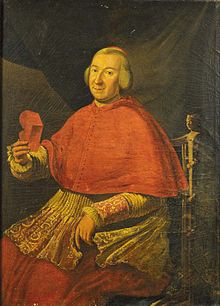Vincenzo Maria Altieri
This article relies largely or entirely on a single source. (June 2018) |
Vincenzo Maria Altieri | |
|---|---|
 Vincenzo Maria Altieri | |
| Born | 27 November 1724 Rome, Italy |
| Died | 10 February 1800 (aged 75) Rome, Italy |
| Occupation | Italian cardinal |
Vincenzo Maria Altieri (1724–1800) was an Italian Roman Catholic cardinal from 1777 to 1800. He belonged to the Altieri family, one of the noble families of Rome.
Biography
[edit]Vincenzo Maria Altieri was born in Rome on 27 November 1724, the son of Girolamo Altieri, prince of Oriolo, and Maria Maddalena Borromeo.[1] Two of his father's brothers, Lorenzo Altieri and Giambattista Altieri were cardinals, while two of his nephews, Alessandro Mattei and Lorenzo Girolamo Mattei would also later become cardinals.[1]
Altieri was made a protonotary apostolic on 3 October 1743, taking possession of that office on 24 August 1747, the same day he became a Referendary of the Apostolic Signatura.[1] He served as prelate of the Sacred Congregation of the Council before being appointed vice-legate to Urbino in December 1755.[1] On 11 November 1756, he was appointed vice-legate in Romagna, and in January 1758 became governor of Ancona.[1] He was appointed to the Apostolic Camera in June 1764, returning to Rome and taking possession of that office in January 1765.[1] He became president of Carceri at this time, then served as president of the Zecca from October 1765 to 1766.[1] He was then president of Ripe from January 1767 through 1775.[1] In April 1775, he returned to the Apostolic Camera in Rome.[1] In May 1776, he became prefect of the papal household.[1]
Pope Pius VI made Altieri a cardinal in pectore in the consistory of 23 June 1777.[1] This was published in the consistory of 11 December 1780.[1] Altieri received the red hat on 14 December 1780, and was awarded the deaconry of San Giorgio in Velabro.[1] He was appointed to the Sacred Congregations of Bishops and Regulars, Council, Acque and Good Government.[1] In January 1783, he became cardinal protector of the Clerics Regular Minor.[1] On 23 April 1787, he opted for the deaconry of Sant'Angelo in Pescheria; then, on 10 March 1788, for the deaconry of Sant'Eustachio; then, on 12 September 1794, for the deaconry of Santa Maria in Via Lata.[1] At this point, he became the cardinal protodeacon.[1] On 29 January 1798, he became Camerlengo of the Sacred College of Cardinals.[1]
In February 1798, Rome was invaded by troops of the French First Republic, who created the Roman Republic.[1] Cardinal Altieri, who was by then gravely ill, was faced with the possibility of being imprisoned along with the other cardinals then in Rome.[1] Rather than face the possibility of prison, Altieri resigned his cardinalate on 12 March 1798; Pope Pius VI reluctantly accepted his resignation on 7 September 1798.[1]
Altieri died in Rome on 10 February 1800.[1] He is buried in the Altieri family chapel in Santa Maria sopra Minerva.[1]
